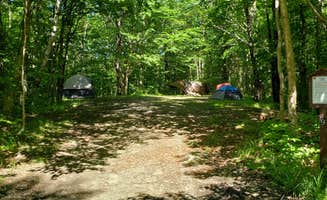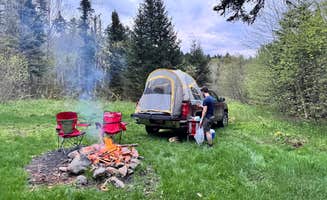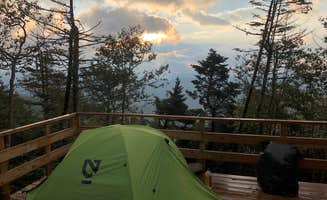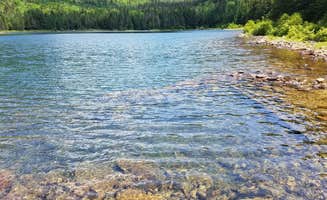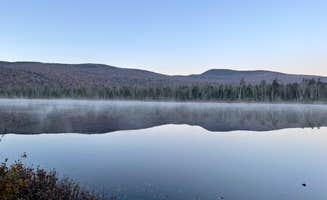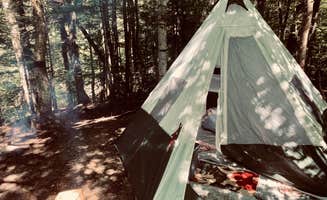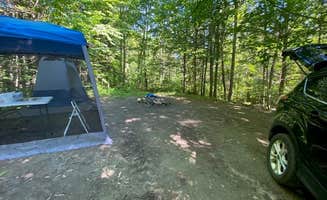Dispersed camping near Twin Mountain, New Hampshire offers primitive sites with varying terrain and access points throughout White Mountain National Forest. The region sits at the western edge of the Presidential Range with elevations ranging from 1,300 to 4,360 feet. Forest roads through the area typically open mid-May through mid-October, with weather conditions determining exact closure dates.
What to do
Hike to scenic viewpoints: From Guyot Shelter, campers can access panoramic vistas. "We got to the site, claimed our platform and hiked over to West Bond to catch a beautiful sunset," reports one visitor, who noted the shelter sits at 4,360 feet elevation.
Fish local waterways: Several dispersed sites provide fishing access. At Town Hall Road, campers report "There are trout in the river and if you cross and go through the woods to the right there's some great spots to explore further!"
Paddle nearby waters: The Connecticut River Paddlers Trail connects to camping options. "This is another beautiful site along the CT River Paddlers Trail. It is well maintained and tucked on a knoll in a pine forest," notes a camper at Scott C. Devlin Memorial site.
Track wildlife: Morning and evening hours provide opportunities to spot native animals. During overnight stays near Elbow Pond, campers report seeing moose tracks and evidence of bears. Morning visits to Cherry Mountain sites offer bird watching with one camper noting "It was so quiet I could hear the sound of crow wings flapping as they flew by."
What campers like
Secluded wilderness settings: Cherry Mountain Road sites receive high marks for isolation. "The campsites are all dispersed enough that we did not hear any other camping sounds at all," one camper reports, adding "It was so quiet I could hear the sound of crow wings flapping as they flew by."
Riverside camping spots: Multiple locations offer water access. A Town Hall Road visitor shared, "We drove down the road a bit, past a few tent sites just off the road... Down toward the river there was plenty of open space so we pitched there and built a fire pit." Another camper noted "There were plenty of sites to choose from and most had access to the river as well as a fire ring."
Proximity to trailheads: Many sites provide direct trail access. At Elbow Pond, "They have a couple different spots where you can park and walk up to your site or they have sites you can pull right up next to them... Theres a nice pond with great views and good fishing."
Flat terrain options: Campers appreciate level ground for setting up equipment. One Cherry Mountain Road visitor noted, "We stayed on site #5 because it was flat, sunny, grassy and had a little brook."
What you should know
Road conditions vary significantly: Many access roads require careful navigation. At Elbow Pond, "The road in is pretty rough and is not recommended for sedans or lower riding cars." Similarly, at Hogan Road pulloffs, visitors warn "About 1km (.6 miles) of gravel road, easy enough for a big road bike, but don't go any further as it gets rough."
Weather impacts site access: Seasonal considerations affect road openings. For Tripoli Road, "Tripoli Road is a seasonal road, opening in late May most years and closing in autumn."
Reservation systems: Most sites operate first-come, first-served. A Tripoli Road camper advised, "It's also first come first serve, so be sure to get up early on Friday for a weekend campout."
Security considerations: Leave-no-trace principles apply, but site claiming requires caution. One visitor to Haystack Road cautioned, "I left out gear to claim a spot while out hiking and came back to people having stolen some of it as well as setting up in that spot."
Tips for camping with families
Site selection strategies: Choose spots with space for multiple tents. Town Hall Road campsites are "all far apart from each other" with many featuring riverside access ideal for children's exploration.
Campsite amenities: Most sites provide minimal facilities. At Guyot Shelter, "There is a picnic table, fire ring and composting toilet box seat," while most roadside sites offer only fire rings.
Activity planning: Incorporate natural features into family time. One parent staying on Tripoli Road reported, "Real hiking experience... hiked down a trail and found the most relaxing spot right by the river!"
Wildlife preparations: Teach children about proper food storage. Multiple campers report evidence of wildlife activity, with one noting, "Beware the ticks! They weren't the worse I've seen, but they are definitely around."
Tips from RVers
Size limitations: Most dispersed sites accommodate smaller rigs only. At Elbow Pond, one RVer noted, "Camped in a very small spot, just barely enough room for our SUV and small teardrop to get off the road."
Solar access considerations: Tree cover affects power generation. A Town Hall Road visitor shared, "If all we needed was a campsite with no solar or starlink, this would be 5 star review... But if you need solar or starlink, there's only 1 or 2 viable spots."
Camping duration: Different areas have varying stay limits. Most White Mountain National Forest dispersed sites allow up to 14 consecutive days before requiring relocation.
Water access planning: No hookups mean self-sufficiency is essential. Campers report relying on local streams for washing but recommend bringing drinking water, as one Tripoli Road visitor noted, "No water or electric. We found there to be a couple of large group camping areas but they were spread out enough not to bother each other."


